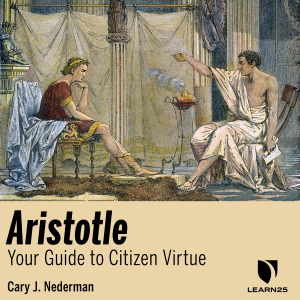

Aristotle: Your Guide to Citizen Virtue
Cary Nederman
How can Aristotle help you become a better person? In this course by award-winning teacher and leading Aristotle expert Prof. Cary J. Nederman (Ph.D., York University), you will become a more ethical person as you explore Aristotelian thought.
The word “politics” is an often-controversial term in our day, conjuring associations with partisanship and subterfuge. But as conceived by the ancient Greeks, politics was essential for becoming a virtuous person. Among the great minds of antiquity, perhaps none remains as relevant as Aristotle, for whom the ultimate purpose of politics was the common good.
Aristotle: Your Guide to Citizen Virtue gives you the rare opportunity to learn from one of the leading experts on Aristotle and political theory. With Nederman, an award-winning professor at Texas A&M University, you’ll explore Aristotle’s historical, intellectual, and biographical backdrop. You’ll also draw connections between this context and the moral and political philosophies of Aristotle. Finally, you will consider the powerful Aristotelian conception of human goodness. In particular, you’ll look at his powerful principle of teleology: all human beings have a purpose.
By grasping Aristotle’s influences and ideas, you’ll come to understand him as a thinker influenced by his time and place. But Prof. Nederman’s course also reveals how he provided the basis for moral philosophy, political thought, and university curricula in the West and beyond. Today, Aristotle remains as vital as ever, inspiring great thinkers and providing insights into contemporary issues. And most importantly, he speaks powerfully about what it means to be a good person. By studying his thought, you will find guidance for flourishing and realizing your full potential.
This course is part of the Learn25 Collection.
Duration - 4h 54m.
Author - Cary Nederman.
Narrator - Cary Nederman.
Published Date - Tuesday, 23 January 2024.
Location:
United States
Networks:
Cary Nederman
Learn25: Biographies
Not Yet Available
Learn25
English Audiobooks
INAudio Audiobooks
Description:
How can Aristotle help you become a better person? In this course by award-winning teacher and leading Aristotle expert Prof. Cary J. Nederman (Ph.D., York University), you will become a more ethical person as you explore Aristotelian thought. The word “politics” is an often-controversial term in our day, conjuring associations with partisanship and subterfuge. But as conceived by the ancient Greeks, politics was essential for becoming a virtuous person. Among the great minds of antiquity, perhaps none remains as relevant as Aristotle, for whom the ultimate purpose of politics was the common good. Aristotle: Your Guide to Citizen Virtue gives you the rare opportunity to learn from one of the leading experts on Aristotle and political theory. With Nederman, an award-winning professor at Texas A&M University, you’ll explore Aristotle’s historical, intellectual, and biographical backdrop. You’ll also draw connections between this context and the moral and political philosophies of Aristotle. Finally, you will consider the powerful Aristotelian conception of human goodness. In particular, you’ll look at his powerful principle of teleology: all human beings have a purpose. By grasping Aristotle’s influences and ideas, you’ll come to understand him as a thinker influenced by his time and place. But Prof. Nederman’s course also reveals how he provided the basis for moral philosophy, political thought, and university curricula in the West and beyond. Today, Aristotle remains as vital as ever, inspiring great thinkers and providing insights into contemporary issues. And most importantly, he speaks powerfully about what it means to be a good person. By studying his thought, you will find guidance for flourishing and realizing your full potential. This course is part of the Learn25 Collection. Duration - 4h 54m. Author - Cary Nederman. Narrator - Cary Nederman. Published Date - Tuesday, 23 January 2024.
Language:
English
Opening Credits
Duration:00:00:41
About The Presenter
Duration:00:01:45
Lecture 1: The Greek Pulis
Duration:00:22:53
Lecture 2: Athens In Peace And War
Duration:00:24:43
Lecture 3: Athenian Culture And The Birth Of Philosophy
Duration:00:23:59
Lecture 4: Plato And His Student Aristotle
Duration:00:24:15
Lecture 5: The Life Worth Living
Duration:00:24:11
Lecture 6: Aristotle's Theroy Of Virtue
Duration:00:24:25
Lecture 7: The Political Animal
Duration:00:24:31
Lecture 8: The Meaning Of Citizenship
Duration:00:24:55
Lecture 9: Forms Of Constitutional Order
Duration:00:24:30
Lecture 10: Justice Versus Stability
Duration:00:24:57
Lecture 11: The Ideal Poets
Duration:00:23:44
Lecture 12: Aristotrlianism After Aristotle
Duration:00:24:11
Ending Credits
Duration:00:00:25